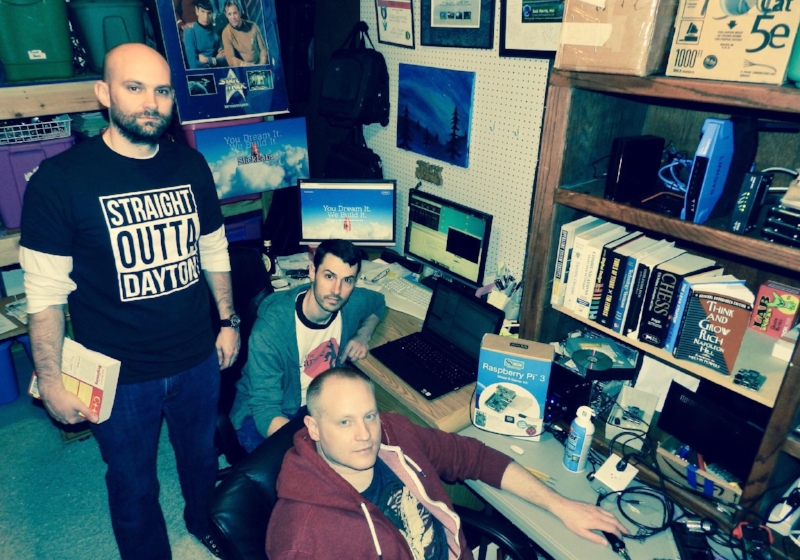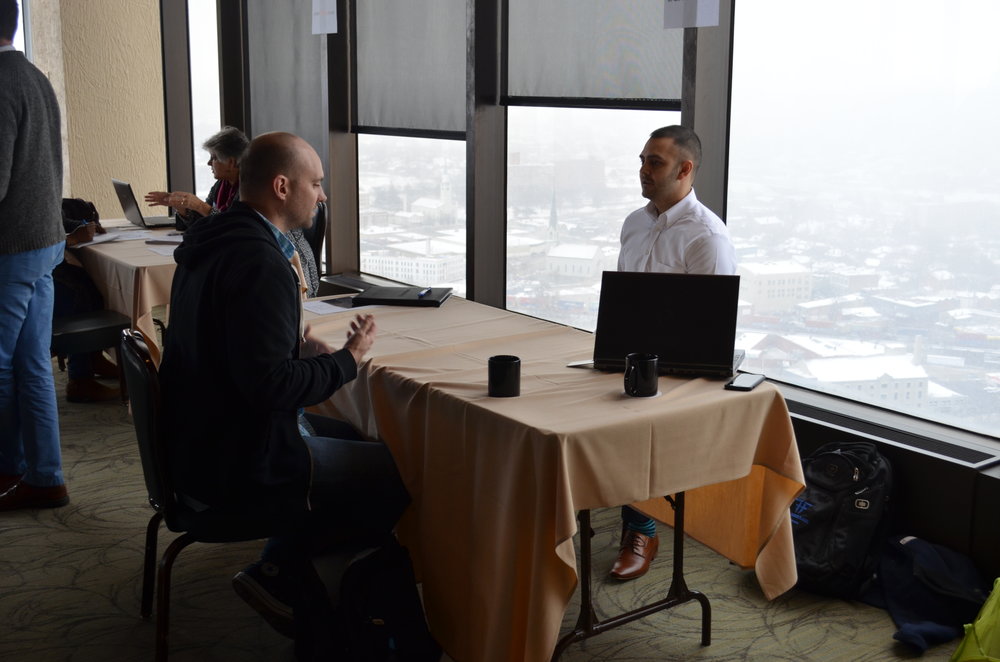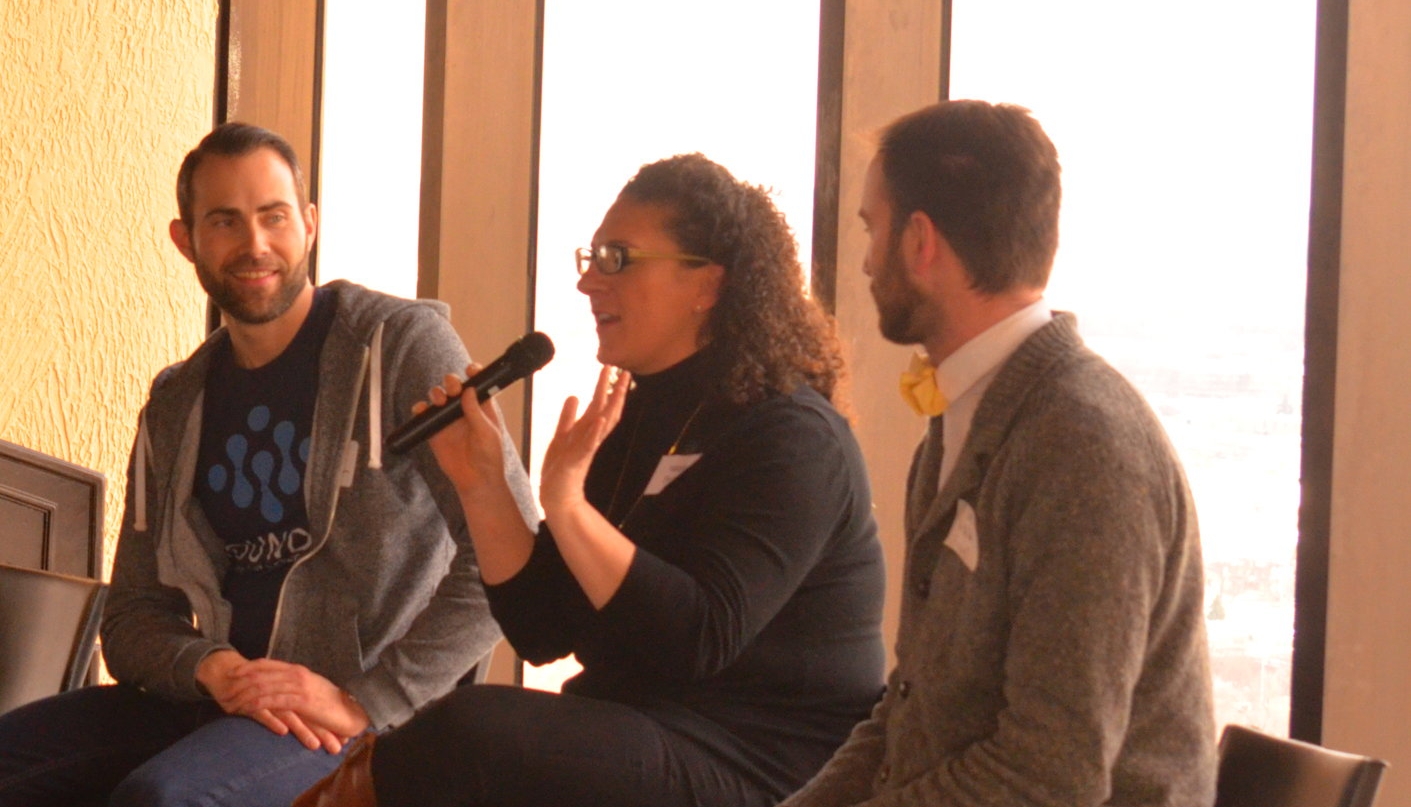
Guest blog post by Jon Downey, Woolpert, Google Partner Director
We know that as a startup, everything is on your plate: marketing, IT, the logistics of your product or service, and more. We want to help you with a piece of the puzzle that is sometimes overshadowed by other, more obvious to-dos—your location strategy.
What’s a location strategy, you might ask? A location strategy involves taking your data and applying location tools to it to derive impactful data to help your business.
Google Maps’ various APIs offer a variety of solutions that can create efficiencies and ease for both internal processes and customer experience. Whether that be address autocomplete or creating apps that involve location or navigation in some capacity, Google’s powerful yet familiar products can be the answer.

Fortunately for Dayton, locally headquartered Woolpert, is an award-winning Google Cloud Premier Partner who has the experience, skills and resources to help you employ Google Maps solutions into your business. Not only is the Google team local to help you on a live, one-on-one basis, Woolpert’s century-long history in the geospatial industry makes our expertise in mapping second to none in the area.
This is our home, and we encourage startups to make our area and surrounding communities a better place to live. We challenge you to see what location can do for you and your growing business. Learn more about Woolpert and our partnership with Google, and request a free consultation on our website, wgmaps.com.
Let’s map things out, together.
Contact Jeremy Quam, [email protected] for more information.
Have an idea worth spreading? TEDxDayton is looking for someone like you to speak at this year’s TEDxDayton on October 20th! Visit www.tedxdayton.com and fill out your application before the April 30th deadline!
Looking for some inspiration? Check out these talks from members of our Tech & Startup community!
Beck Besecker
Ben Callahan
Brad Doudican
Darren Kall
Tyler Back

For a long time, people thought that entrepreneurship was not something you could learn in a classroom or out of a book. Times have changed. More and more major universities are finding fascinating ways to encourage and educate young and hopeful entrepreneurs. A lot is at stake for “studentpreneurs.” It isn’t easy to make your dream into a reality, but many of the young collegiate entrepreneurs are doing it every year!
Dayton is known as a breeding ground for innovative thought and the birthplace of the entrepreneurial spirit. With our rich history of invention, and the countless number of new creations coming from the Gem City every year, we know what lies around the corner for Dayton. It’s no wonder that the spirit of entrepreneurship is alive and well at Wright State University.
On March 29th, the winner of a new venture competition was selected. The winner of the competition receives a $5,000 loan from the generous donations of James Family Foundation and the support of local entrepreneur visionaries. The hope is that they use these resources to create a sustainable foundation for their business and execute the plans they developed in preparation for the competition.
The winner of the competition this year is Gabriel Tamborski, an engineering student from the university. His new concept for a cheaper, easier to use, and quality 3D printer, fascinated the judges referred to as the “Wolves.” Tamborski’s printer makes 3D printing accessible to DIY enthusiasts.


“I don’t measure success by my personal accomplishments. I measure by the accomplishments of the 10 closest people to me. If these people are successful then I feel successful.” This is Rob Slater’s mantra. Rob is a fresh entrepreneur on the Dayton scene with a few experiences that set him apart from most of his fellow counterparts in the startup community.
Rob spent much of his earlier life surrounded by a family of innovators and entrepreneurs. “I grew up in a household of entrepreneurs but didn’t realize it. There wasn’t a time that my father didn’t own his own business” said Rob. “He and my mother were always coming up with new ways to make ends meet. I remember my mother finding furniture at a bargain price, refurbishing it, and then reselling it to make a profit. At the time that didn’t seem like entrepreneurship but now it does.”
Rob went to Clemson University for his Bachelor’s in Electrical Engineering while also being in the ROTC. Right out of undergrad he married his wife who now works for Miami Valley Medical Center on the nursing staff. “We both have the mindset of an entrepreneur which makes for some great times,” Rob remarks with a smile on his face.
When he first began his career in the Air Force, he received extensive training as a pilot but quickly decided that flying was not for him. Throughout his career in the Air Force, he worked on several projects and in various departments accumulating a vast amount of experience in sensor systems and other engineering projects. While a program manager, he was able to make a connection with a Developmental Engineer, Dave Chick. Dave and Rob began to collaborate on projects and eventually came to the conclusion they needed to begin doing the same things but on their own. Then SlickLabs, LLC was born.
Wondering where the name comes from? Slater + Chick = SlickLabs.
SlickLabs designs, develops, and delivers electronics and software prototypes using lean, intuitive methods to deliver minimum viable products at a minimum viable price. Rob’s title is founder and “Ninjaneer” (Ninja Engineer). “We love working on projects involving the internet of things (IOT), analog/digital design, machine learning, big data and everything in between. But over the next year, our main focus will be in IOT home system integration”. Jack Harris is the other member of Slick Labs who brings his expertise of software development to the team. The three bring together hardware, software, sensor integration, and analytics to iron out technological advances. Founding SlickLabs was only the first step in Rob’s entrepreneurial journey, though.
Last year Rob joined Ascend Innovations™, a new venture between the Greater Dayton Area Hospital Association (GDAHA) and Kaleidoscope with a focus on combining purpose driven design and state of the art technology to develop an ecosystem that produces commercially viable solutions in human health innovation. Rob works as a Senior Design Engineer, leveraging his vast technical experience with his Master’s in innovation and entrepreneurship from Wright State to support the lean startup approach that Ascend offers. Before Rob came on board with Ascend, they formed a project known as Vye.
“With the vast healthcare market in Dayton, it is easy to get in that space with full-support,” Slater says. “Currently, Vye is not separate from Ascend but will be in the future.” Vye is a new technology to deliver real-time concussion assessments to the parents and coaches of young athletes. Through a simple guided test, Vye can be used to provide objective and quantitative results pointing to potential head injury or concussion. According to Slater their latest backer is Anthony Muñoz, NFL Bengals Hall of Famer.”

Rob and the team at Ascend are really changing the way we look at healthcare innovation. He and his team of merry engineers at SlickLabs are capable of providing amazing services and developing products that could provide solutions for power grid sustainability or solving real-time healthcare problems while providing research-based analytics to solve real world problems.
Slater advises, “Whatever you are doing, make sure you have something to show for it. It needs to be something your customer can experience with their senses. Have real results that you can leverage.”
Austin Rains

UPDATE: Arielle will be one of our featured presenters at the March edition of Early Risers! Want to hear her pitch? Register for Early Risers.
Two months ago, New Orleans native Arielle Jordan sat in her home contemplating the options for the future of her startup DreamStarter. Having founded DreamStarter in 2015 with the idea of creating a hybrid of various social media networks that would allow experts, coaches and content curators to connect with their clients and followers in a healthy, subscription-based online environment, it seemed that her progress had hit an impenetrable wall.
“I just wasn’t getting the support from the community that I thought I’d receive, ” Arielle noted along with several other factors that made the likelihood of her success minimal.
“I was working part-time while exploring my startup. This was a way for me to pay the bills and keep my idea alive. It was a real struggle to stay above water because everything costs a lot in New Orleans. I lived a low-income neighborhood where just a few blocks from home, I was carjacked at gunpoint.”
“The carjacking was sort of the last straw for me. I had every opportunity to leave before but this really pushed me to search. My sister is a personal trainer and health fitness guru in Urbana. On our weekly phone calls, she kept telling me that I should bring my dream here to Dayton, Ohio because it was more affordable. I began to frantically search the web for the resources that would be available for me if I moved out here and sure enough, I stumbled upon Dayton Tech Guide and The Entrepreneur Center. Dayton Tech Guide had an amazing compilation of resources and showed that there was a lot going on in the Dayton startup scene. Plus, they sponsored some cool events that I could get plugged into, and that got me motivated to take the next step.”

Having made the decision to explore a fresh start, she packed her bags and headed to Ohio, where she has now lived for about a month. When asked what she thinks about Dayton so far, she said, “First of all, I think the cost of living is much more reasonable if you are trying to get a business off the ground, and secondly, it seems like Dayton is in the early stages of a startup revolution. There’s a lot to do, and there’s a strong sense of community and support.”
Arielle is searching for developers who can help bring her vision to life. “We have very little development help in New Orleans, so it is refreshing to get here to Dayton and see a nice population of developers”.
Visit her site, Connect with her on LinkedIn, or meet her at one of our local events like Pints & Preneurs.

Want to build a business in one weekend?
Then sign up now for Dayton Startup Weekend! Not to be confused with Dayton Startup Week, this crazy, hectic, fun 54-hour event begins the evening of Friday April 21st with people pitching ideas for a business and concludes on Sunday afternoon with teams pitching their business to a panel of judges made up of the local entrepreneurial community.
Teams organically form around the top ideas pitched and then spend the rest of the weekend building their business model, coding, designing, finding market validation and preparing for their pitch on Sunday.
It’s difficult to explain the process and awesomeness that will be Dayton Startup Weekend, so we found a video from Startup Weekend Toronto to help.
Whether you are looking to found a company, find a co-founder, meet new people, or learn a new skill set, you will leave the event better prepared to navigate the chaotically fun world of startups. If you want to put yourself in the shoes of an entrepreneur, register now for the best weekend of your life!
 February’s featured entrepreneurs share their individual funding stories. Photo credit to AJ Ferguson of UpDayton.
February’s featured entrepreneurs share their individual funding stories. Photo credit to AJ Ferguson of UpDayton.
Coworking is fairly new in Dayton but events like Start Downtown’s monthly Cowork At [Fill in the rotating location] and venues like Nucleus Co-Share have opened many people’s eyes to the opportunity to work independently in a social setting with people who share similar core values.
This month, 100 entrepreneurs & community partners gathered at the Dayton Racquet Club on February 9th for Cowork At The Top. Here’s our recap of the day to get you on board for the next Start Downtown coworking event.
The day kicked off at 9am with people grabbing their coffee and pastries and finding a home base for the day. Many people settled right into their morning routine of responding to emails but some took advantage of the co-location and set up impromptu meetings and handled their business in 5-10 minutes instead of an email chain dragging on for days.
 Tables with the best views went quickly at Cowork At The Top. Here’s a view of Riverscape and The Great Miami River from the the Racquet Club.
Tables with the best views went quickly at Cowork At The Top. Here’s a view of Riverscape and The Great Miami River from the the Racquet Club.
The morning and afternoon featured open office hours with experts in their field to help startups. These drop by sessions allowed for a quick consultation to get advice on an issue or began the first step in longer process. Resource partners included:

Lunch featured a panel of local entrepreneurs discussing their challenges in raising funds to operate their business.
Eron shared his struggles raising the capital he needed to create a company that includes hardware (not necessarily a favorite of venture capitalist) and in the music industry (definitely not a favorite of venture capitalists, think Napster). Eron pursued though and eventually raised the funds he needed through CincyTech, Accelerant, and local angel investors.
Soundstr is now manufacturing their product and raising more funds.
When the time came they looked at purchasing an existing restaurant (which normally means one going bankrupt) and the ability to get funding was relatively easy. When these two young aspiring entrepreneurs decided they wanted to create something new though, the ability to land funding proved difficult. In the end, they were able to work with CityWide and get the funding they needed from a local bank.
Corner Kitchen is already ahead of pace on their most aggressive 3-year estimate, just a year and half into business.

Fronana launched a Kickstarter that ultimately failed, but Bobby got enough validation from the experience to invest his own time and money into the business. Along the way he got help from friends and family but his growth to this point has primarily been driven by sales.
Fronana is in grocery stores across the midwest but is looking for partners & investors to help them grow nationally.
After lunch, it was back to business. Some people had arranged client or partner meetings in the space and found an isolated spot for confidential discussions, others put their headphones on (a trick we told everyone in our 4 Myths of Coworking blog post) and got back to building websites, products, and answering emails
 Photo Credit to AJ Ferguson of UpDayton!
Photo Credit to AJ Ferguson of UpDayton!
At the end of the workday, people enjoyed some drinks and conversation at happy hour and then hung around for Startup Grind Dayton, which featured Andrew Klein of local startup Smart Barn.
We would love to see you at the next Coworking Day on March 9th. The location will be announced soon and we will be sure to share it in our newsletter! Don’t get our newsletter? Sign up for it here!

Dayton Tech Guide was founded with a strong social purpose. Every step we take is governed by our mission of positively impacting Dayton’s startup community by creating a better-connected business network. If you’re like us, you see your startup as not only a means of making money but a vehicle for carrying out a greater social purpose. But how can you ensure that as your company grows, your social mission stays intact? Erin McClarty gives us some clarity on this matter in her latest Startup Grind post.

Scientists have been trying to understand the environments that employees thrive in for years. In a recent study, researchers reported that people who belong to these co-working spaces report higher levels of thriving and a feeling of fulfillment in the work they do. Compared to employees who work from regular offices, they scored a whole point higher on average. Who can work from these spaces? Well, really anyone. Freelancers, remote workers, and other independent professionals can share their work space in a communal setting while enjoying the benefits that these innovative spaces offer. These individuals can work for a wide range of various companies, ventures, or individual projects.
Many of these spaces carry a more relaxed feel which prevents the direct competition or internal politics within your traditional office spaces. It also creates a culture that encourages collaboration across all levels and hampers the work persona some of us put on when we are in the office. The culture of a co-working space is that it normalizes giving each other assistance on projects and encouraging a collaborative spirit amongst the individuals. The person sitting next may have a skill set that you need and don’t have at your disposal. The physical closeness of that individual allows you to easily communicate and benefit from.
So easy collaboration, relaxed work environment, space that encourages meaningful work. Who wouldn’t want to work there? Well, do you already have an office? No worries! You can still join. In fact, that research shows that spending time away from the office can encourage innovative thoughts and spark new ideas. Co-working is also a more affordable way to attain a high-class work space. These spaces are typically in stellar locations that may otherwise be unattainable. They are designed with quality and functionality in mind, allowing you to be comfortable while you work. There is no pressure with long leases, increasing the flexibility of co-working even further. Because there is no need to purchase entities necessary for an operating office, like desks, printers, or lighting, overhead costs are greatly reduced. Dealing with seemingly constant repairs, service fees and office maintenance are a thing of the past when co-working. These spaces usually involved a reasonably priced membership fee and extra costs associated with having a designated desk for office space for your team.
Interested in experiencing what it is like to be in a co-working space or want to try it out before you make a decision? We have some events on our calendar you should check out. Nucleus, a co-working space right here in Dayton has a free workday on Friday, February 3rd. This is a reoccurring event on the first Monday of every month.
We also have an open co-working day at the Top in the Dayton Racquet Club from 9am-6pm. Don’t miss out on this opportunity to connect with some of Dayton’s most creative entrepreneurs, designers, developers, and difference-makers. We will see you there!

Even if you aren’t a sports fan, the concept of having a “game plan” before heading into an athletic event shouldn’t be a foreign concept. In fact, I think we can all agree that if a team or an individual taking part in a serious competition doesn’t have a game plan before starting, the likelihood of success will be minimal. Even in a friendly backyard game of one-on-one basketball, you would quickly devise your plan of attack, whether it’s focusing on outside shots or taking your buddy to the hoop with aggressive layups.
Business[…] couldn’t be any more similar.
—The Tax & Legal Playbook: Game-Changing Solutions for Your Small-Business Questions, Mark J. Kohler
So what is a business plan and what content is most important to include? Is it the financial projections? What information do investors really want to see? According to William A. Sahlman, Professor of Business Administration at Harvard Business School, any experienced investor will see past the number mumbo jumbo and will be looking for a great business plan that focuses on 4 specific areas.
According to William, these factors include the “people, the opportunity, the context of the business, and the possibilities for both risk and reward from your business.”
Here are some examples of the types of questions they want to see answered:
A strong and effective business plan is not easy to come up with, largely because small business owners and entrepreneurs are usually highly optimistic and visionaries in their field. It can be hard to think about the very fine details when you’re used to thinking at a 30,000 foot level, but it is the fine details that must be thought out in order to execute the 30,000 foot strategy.

Thomas Harrison, Chairman of Diversified Agency Services, shared his views on the key elements of a successful business plan, and when asked to give an aspiring business builder advice on the development of a great plan he said “I think some people get confused between a business plan and a marketing plan. A business plan is genetic, molecular definition of your business. It crystallizes why you’re in business and shouts what you do to the world, for consumers, and for your customers. It dissects your business’s DNA and how it is unique and it clarifies why customers should do business with you.”
“The “Plan” is the blueprint; it’s the architect’s renderings that show the skeleton of the business… the DNA of the business. The Plan allows me to be crystal clear about that skeleton and how it supports my vision of my value (the business value) to my customers. It explains exactly why customers will buy what I make/sell and what it is about my product that will delight my customers.”
It is the plan that supports your efforts to communicate the value of your business. Why would anyone not want this to absolutely perfect?
–Written by Austin Rains, Dayton Tech Guide Content Wizard